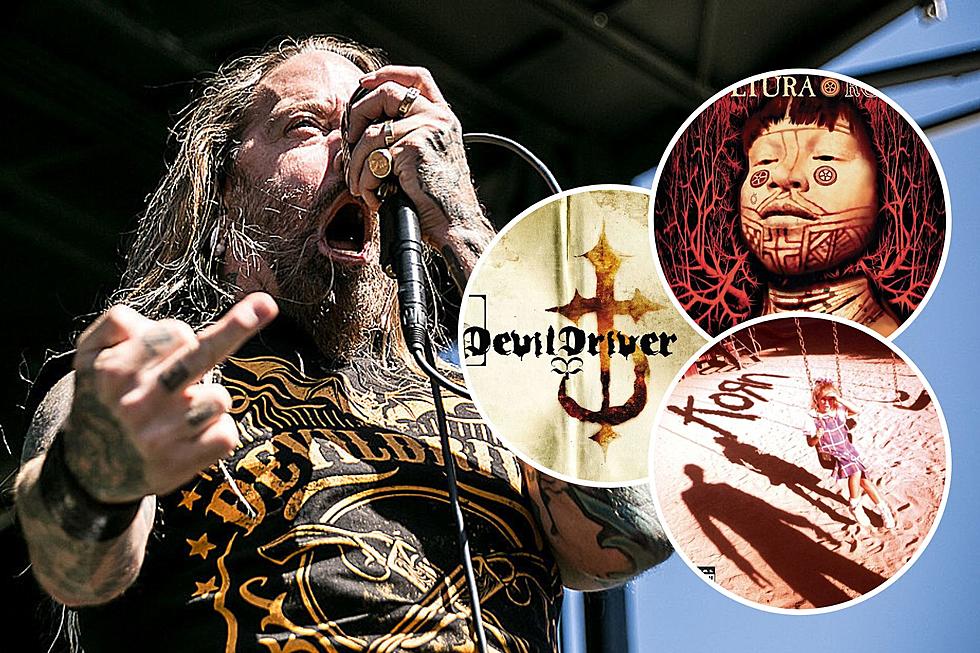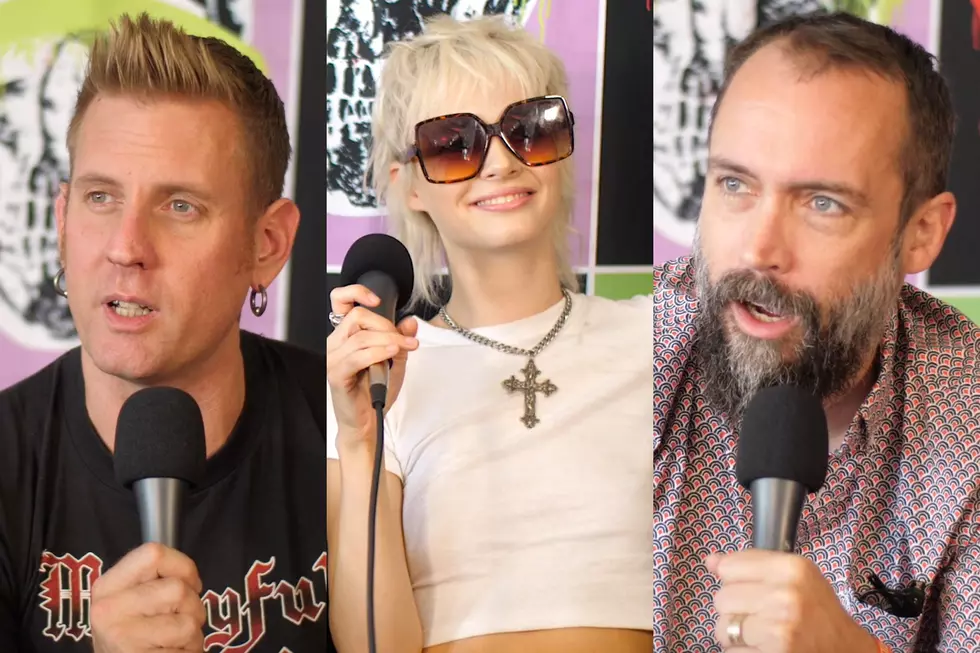
Clutch Frontman Neil Fallon Talks New Album ‘Earth Rocker,’ 2013 Tour + More
Clutch are gearing up for a big spring and beyond, as the band recently completed their 'Earth Rocker' album which has already spawned the stellar lead single of the same name. Plus the band is headlining a must-see tour package this spring, heading out on the road with Orange Goblin, Lionize and Scorpion Child, followed by dates with the Sword.
Fresh off a European tour supporting the upcoming disc (due March 19), frontman Neil Fallon took the time to speak with Loudwire about the band's faster-paced new music, taking an unorthodox approach to recording with producer Machine and the creation of a few of the 'Earth Rocker' album's standout tracks. He also addresses his different vocal styles and the band's 2013 tour. Check out our interview with Clutch's Neil Fallon below:
This album is more of a straight-up, right-to-the-point rock record. Did you guys have that planned out in advance or did it just play itself out during recording?
It was a little bit of both. I think the first songs we started writing after 'Strange Cousins' were faster, and I think we realized we liked that. It seemed fresh to our ears so we were like, 'This next record let's just not overthink it, but write a very fast for Clutch record and one that was sufficient and cut right to the chase.' That was really the only kind of forethought we had going into the studio. But the writing process for this record is very similar to any other record though.
I know you do tend to experiment on songs, but like you said, this is much more quick. Did that force you to approach things differently?
Well, I think it's just easier to write lyrics to songs that are faster. There's less air to fill up with words. We were writing songs that we considered to be fast already but then [producer] Machine stepped into the mix and he kind of pushed us to go even faster. At first, it sounded cartoonish to us, but we just weren't accustomed to that and then we got used to it.
I'm glad he did that because we've been a band for 22 years and it's easy to get into a comfort zone. We pushed ourselves out of that a little bit with Machine's help. And the thing that stands out about this record more than the others is that we did more pre-production for this record. We walked into the studio to track it knowing exactly what we were going to do.
I heard you guys recorded your parts separately in the studio. Was there any anxiety over recording that way and how did it sound to you the first time you heard it whole?
It was very reassuring. We were taking a lot on faith. I know my guys are gonna play exceptionally, but we're only hearing some bus mixes to track. I never even saw [drummer] Jean-Paul [Gaster] in the studio, which was a very bizarre experience. And then towards the end when Machine did some rough mixes for us where he unmuted all the tracks, it was pretty astonishing. I wasn't aware of all the multiple tracks they had done and I'm sure all those guys weren't aware of all the tracks I had done. It was a fun surprise. Machine knows what he's doing but for us it was an unorthodox way of doing business.
There are references both musical and lyrical to some of the great rock that's influenced you. How conscious were you of what to put in and how closely you wanted it identified?
I think it kind of happened instinctually. Coming off a Motorhead and Thin Lizzy tour really turned our heads toward a period of rock we'd grown up on, but maybe we'd heard so much we'd grown a bit deaf to it. And now that we're older we can listen to these bands with a more educated ear. At least I'd like to think so. And even though we didn't intentionally try to pay tribute to anything, I think just having that in our subconscious helped out a bit.
Lyrically, I had been thinking about rock 'n' roll quite a bit -- the state of it, the history of it, the future of it. There may not be many literal commentaries on that in the lyrics, but I think it ducks in here and there.
'D.C. Sound Attack' has that great bluesy sound, complete with harmonica. Can you talk about some of the stuff you added in and how that song came together?
When we were recording it, that first riff that opens up the song we were kind of sitting on the fence with it. We were kind of saying to ourselves, 'This sounds too much like a Clutch riff.' And then Machine kind of looked at us and said, 'Yeah, and your point is what?' And that was kind of a revelation to us. Even though it's important to stay fresh and try new things, it's also important to embrace and do what you do best. So once we kind of accepted that it was easier to deal with the song.
We wrote the song pretty much as you hear it, but then Jean-Paul brought up the subject of that percussion break in the middle. And that's something that we've been doing live for years and years and years which is really kind of a classic, rudimentary kind of D.C. Go-Go rhythm breakdown. JP's a huge D.C. Go-Go fan and we all grew up listening to D.C. Go-Go on the radio and hearing it at high school football games and he said this song is the perfect tempo and has the perfect swing for one of those breakdowns, so we inserted it right in the middle. We've been doing it live. I've been feeling a little bit one-man-bandish in that song with harmonica, cowbell and a vocal mic, but it's a lot of fun. It keeps me busy.
Your singing on that song is more like a preacher approach. It's more theatrical. As a vocalist, how fun is that for you to bring to the table?
It's fun. I mean melody and pitch have never been my strong suit and I've always kind of leaned on rhythm much more. When I heard Chuck D. and Tom Waits for the first time, those guys I think were a big influence on me at an early age in Clutch. The preacher thing, people have said that to me and it's something I didn't do intentionally, it just sort of happened. Maybe it was just a nervous affectation.
But I listened to a lot of blues, holler blues which owes a lot to gospel. I didn't grow up in the Southern Baptist tradition by any stretch of the imagination but that influence on blues and then later on in rock and roll is something that I just gravitated towards and I found that a lot easier than trying to do some really piss-poor Robert Plant rendition.
With 'Crucial Victory,' I have to ask this, but Neil, have you quit your lowdown ways? Can you tell me the backstory of how that conversational piece of the song came to be?
When I sing in the first person, I tell myself it's not Neil Fallon. You're assuming the voice of someone else just like any alter would. That's just sort of the case with this song, which is just sort of a pastiche of Philip K. Dick ideas -- like 'Do Androids Dream of Electric Sheep?' or 'Minority Report.' Then at some point, and I don't remember when exactly it was, but I was listening to Robert Johnson and John Lee Hooker and both of those guys and a lot of other blues guys refer to themselves in their songs and I realized … that's pretty bad ass. That's pretty cocky and I put it in there for the same reason. It's just kind of shocking and takes you out of the song for a minute. It takes me out of the song and I'm singing it. Suddenly I thrown out and then I get back into reality and that's really my only justification for it.
I see you're heading out on tour. I know Kyng just had to drop off, but you've got Orange Goblin, Lionize and Scorpion Child. Any thoughts you can share on touring with the other acts on this trek?
We've known Orange Goblin for years and they're a fantastic band with a great new record. Lionize are good friends of ours as well -- a very unique sound. And Kyng, that's just a bummer that Tony [Castaneda] was in that wreck. They're an exceptional band that I think we'll hear a lot of in the future. Jim Rota I think is producing their next record as we speak. And Scorpion Child I had not heard of until Kyng dropped out. I was sent some music and it was pretty cool. It kind of reminded me of Dio-era Sabbath or Rainbow. It's a very classic early metal sound that you don't hear a lot of.
[Editor's note: A second leg of Clutch dates with The Sword was announced shortly after our interview with Neil Fallon.]
Any talk yet of what from the new album might fit into the set lists? Anything you're really looking forward to getting out there for the people?
We just finished the European tour a couple of weeks ago and we're playing nearly half the record. Not every night, you know, but three or four songs a night. I'm anxious to see the U.S. crowds' reaction to 'Gone Cold.' That went over really well overseas. Sometimes playing quietly shocks the s--- out of people, more so than blowing their heads away with amplification. I'm anxious to play that one and I think this is a record we could easily play from front to back.
I agree. Before we wrap up, 'Gone Cold.' That's sort of a nice change-of-pace track, especially where it's placed within the record. You mentioned that going over really well. Can you give us a little on that song and how it came together?
This is one of the first times we listened to the record as we were writing it and said, 'Well, what do we need to make this a better record?' Usually what we say is we need to write some more fast songs. This time around, we needed to write some more slow songs. And we wrote this one in particular just for that reason.
It's got some relation in finger-picking style to 'Regulator' off of 'Blast Tyrant,' but at least to our ear, we're trying to capture some of the vibe you get from Funkadelic's first record, on one or two of those tracks. There's just this real sense of limbo. We put the song in the middle, trying to pace this like a classic vinyl record where you have ten songs that seem like two chapters of a book and this is sort of the moment in the book where the plot turns and you get taken into a different direction.
Our thanks to Clutch's Neil Fallon for the interview. Fans can look for the band's 'Earth Rocker' disc in stores March 19. It's also available for pre-order, with multiple bundle options, here.
Listen to Clutch's 'Earth Rocker'
More From Loudwire









